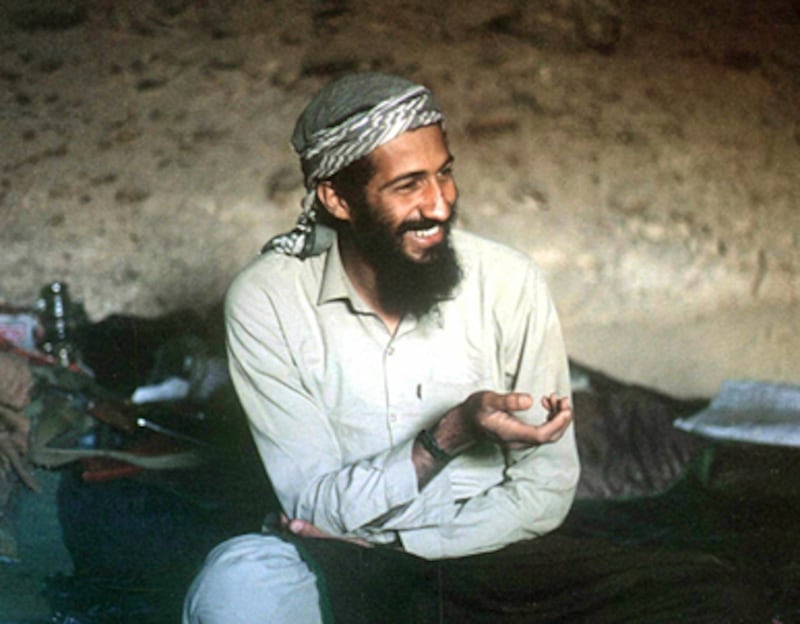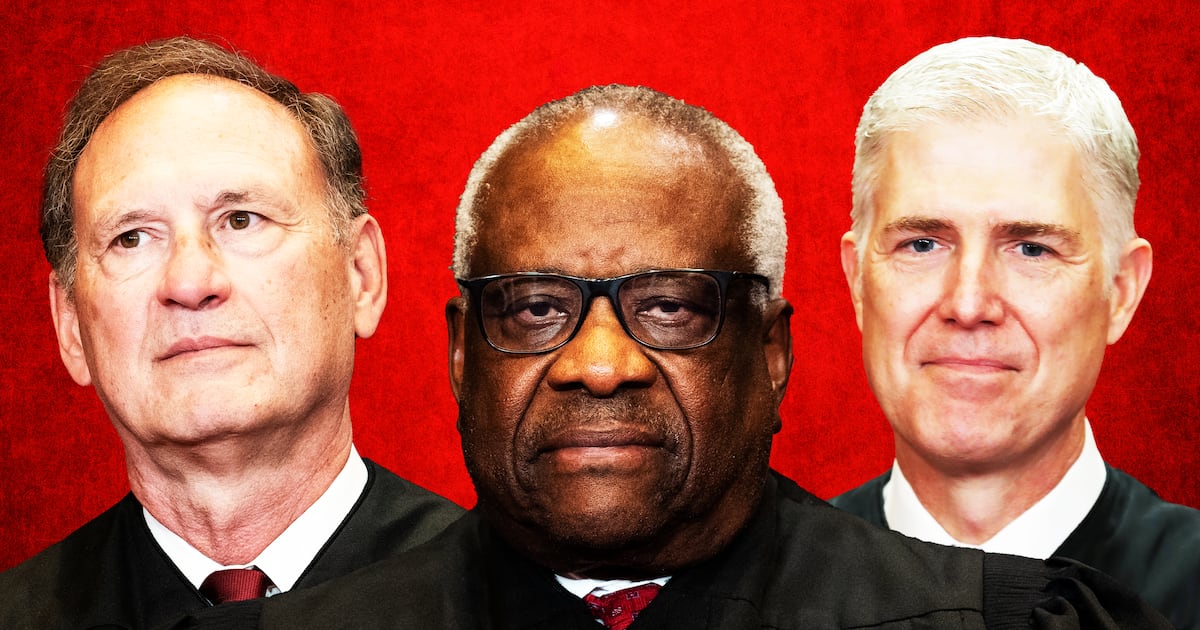Obama finished the job, but taking out Osama bin Laden was one of the Bush administration’s top goals. W.’s top aides, from key confidante Karen Hughes to Rumsfeld deputy Steven Bucci, reflect on the kill.
Plus, full coverage of bin Laden.
When U.S. forces finally found and killed Osama bin Laden this week, attention naturally focused on President Obama and his administration. But the chase lasted nearly a decade—and most of it spanned the bulk of George W. Bush’s two terms in office. In interviews with The Daily Beast, former Bush officials reflect on the hunt—its urgency and its frustrations.
ADVERTISEMENT
Marc Thiessen, speechwriter for Donald Rumsfeld (2001-2004) and George W. Bush (2004-2009)
“I was in the Pentagon on September 11. I was blessed to be a few corridors down from the impact. But I felt the walls of my office shake, and I smelled the smoke in the hallways, and we all walked out—and the one thing I remember very distinctly was that there were no alarms that went off. No evacuation alarms. We all just sort of walked out to the River Terrace and looked out at the burning Pentagon. … The alarms went off in the Pentagon many times after 9/11, and every time we walked out onto the terrace and looked up at the sky, waiting for the attack that never happened.”
Photos: Osama bin Laden’s Life

“We all take for granted that we’re almost 10 years away from 9/11, and they haven’t managed to carry out a successful attack on the homeland. But if you were to go back and ask anyone virtually on Sept. 12, 2001: ‘Do you think that we will go 10 years without another attack on the homeland?’ Very few people would have expected that we would have gotten that far. We were all expecting the second wave. … That was a stunning success of an attack. And we didn’t know who they were or what they had planned. We all assumed that there was something else coming. So we all had our hairs raised on our arms as we went through the efforts that we went through.” “I think President Bush was always focused on bin Laden to some extent. I think the effort never really stopped to get bin Laden. But the real focus was on getting intelligence to stop terrorist attacks.”
Steven Bucci, Col. (ret.) U.S. Army Special Forces, Military Assistant to Secretary of Defense Donald Rumsfeld
“I was in the building [Pentagon] on 9/11. I knew people who got killed. It was kind of personal. Being there in your polyester pants and shiny dress shoes, it’s not what you think you’re going to wear when you go to war. [But catching terrorists is] not as easy as it is in the movies and TV. We don’t have the two-hour limit where we have to wrap the story up.”
“To be honest with you, we didn’t know where he was. It was incredibly frustrating. We never had anything vaguely close to usable intelligence. People in the military and the intelligence community are performance-oriented types. They want to accomplish the mission.”
[On the failed operation at Tora Bora in December 2001] “We, along with everyone else, thought he was in Tora Bora when the operation started. And we thought we had enough forces—both military Special Ops, conventional military forces and the Afghan forces that were fighting with us. Obviously he was able to slip through, and that was a disappointment.”
“[Rumsfeld] was hugely disappointed. He really wanted to catch him for what he had done. He never lost focus on getting him, despite what some folks said.”
Photos: The World Reacts

Karen Hughes, key Bush aide and later Undersecretary of State for Public Diplomacy
“[Bin Laden] would suddenly appear. We’d go months and not hear a word from him. And suddenly there would be a message from him.”
“I think it was always maybe a sense of anger. [When bin Laden released a video in 2004], it was clearly timed to the elections. It was clearly an attempt to try to manipulate public opinion in the election. From my perspective at least, there was a feeling of anger that he would try to inject himself. It was almost as a way of taunting us.”
Juan Zarate, Deputy National Security Adviser for Combating Terrorism
“We had a very clear sense that it was not only a big symbolic goal to get bin Laden, but also strategically very important to decapitate the leadership to try to help crumble the organization by taking out its founder and cohesive leader. …There’s been a persistent hunt for bin Laden. But I think people found it hard to believe when we weren’t able to show progress.”
“There’ve been plenty of false leads or near misses with respect to senior leadership of al Qaeda, so when you’re in that business you tend not to get too excited about raw pieces of data that haven’t yet produced a picture. … There was not a single day or moment where I could say ‘Ah, we’re onto it.’ I think there was always hope the courier networks would get us there, and as we were pushing fronts—it wasn’t just that angle but others—there was always hope that we would find a breakthrough, that we would get the piece of data that would begin to unearth a trail back to bin Laden.”
Stephen Hadley, National Security Adviser
“It’s very frustrating. The most we had during much of this period was a belief that he was somewhere up in the northern frontier areas. In a very remote location, being protected by local tribes. We couldn’t understand with all the publicity on bin Laden, and offers of reward, and everything else, why someone in his organization did not betray him. And didn’t turn him in. But nobody did. And it was very frustrating because for the longest time we had virtually no leads on actually where he was. And that’s why when we started to get some human intelligence sources like the folks in Gitmo, who said there were these couriers and began to identify those people. It was at least something that the intelligence community could work with.”
“There were other things that did not pan out. But this is pick and shovel work. It’s really working very hard to build the case. To put together the pieces of the puzzle. [The courier angle, which began bringing real results in 2007] was an important lead, and we tried to follow it. This looked like a promising lead that ought to be pursued. But it was a long way to go between having that lead and getting to the point where we knew where Osama bin Laden was. And that’s the journey that the intelligence community went on for the next four years.
“The president [Bush] made clear he would like to get bin Laden before he leaves office. Beginning probably a year from the end, he would say to (then-CIA director) Mike Hayden, ‘Now Mike, you need to get bin Laden before I leave office. That’s a priority. … [Then] he’d say, ‘Hey Mike, another week’s gone by, how’s it coming?’ And it was done in a kidding way, but with a real seriousness.”
Lincoln Bloomfield Jr., Assistant Secretary of State for Political-Military Affairs
“He had eluded capture, he had eluded detection for so long, so [his death] was surprising. I was very impressed at the apparent courage and daring of the military operation. The other major reaction was watching the spontaneous gathering of crowds late at night both at the White House and in Times Square in New York. Granted, there were college kids who probably saw it as something that was fun to do. But there was no question that it was a passionate public outpouring that wasn’t against anyone in the United States. There was no factionalism involved in it all. No politics.”
Mike Giglio is a reporter at Newsweek.
R.M. Schneiderman is a reporter for Newsweek.
Christopher Dickey contributed reporting.







